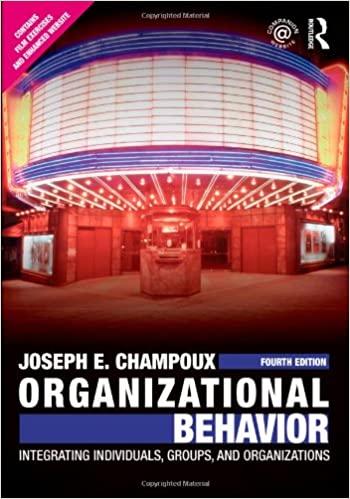Discuss the different ways of expressing the need for power as described in McClellands achievement motivation theory.
Question:
Discuss the different ways of expressing the need for power as described in McClelland’s achievement motivation theory. Which of the two types of power do you respond to best? Why?
McClelland’s achievement motivation theory:
David McClelland and his colleagues studied the role of the need for achievement, the need for power, and the need for affiliation in deciding human behavior. McClelland and some colleagues thoroughly studied the need for achievement, although they investigated all three needs. McClelland’s achievement motivation theory, and other directly related theories of personality such as Murray’s, is the product of an impressive, long-running research program. Controversy has surrounded the measurement methods of such theories, although some studies show the validity of different measures.
Atkinson and his colleagues have successfully rebutted this criticism, allowing some confidence in the research results. Other critics describe the research activity as chaotic and not allowing definitive conclusions.
The three needs are each associated with different behavior. As you read the following descriptions of a person’s behavior with high need strengths in each need, think about your behavior. Possibly one of McClelland’s needs is most characteristic of you.
People with a strong need for achievement take responsibility for the results of their behavior and want to solve problems. Such people like to find the means for overcoming obstacles. They want to succeed, but they are willing to take calculated risks. High need for achievement people analyze situations, try to understand the chances of success, and set moderate achievement goals for themselves. Such goals are neither too easy nor too difficult to reach. These people prefer to set performance standards for themselves and do not respond well to externally applied incentives. They seek situations that allow achievement satisfaction and prefer nonroutine tasks to routine assignments. They look for and welcome feedback about how well they are doing. Skills, abilities, training, and experience all add to the performance of an achievement-motivated person. A highly motivated person who also has high ability will outperform an equally motivated person with lower ability.
McClelland felt people acquired the need for achievement through socialization to the values of their culture. He based this conclusion on the results of his extensive studies of the presence of need for achievement concepts and themes in the folklore, mythology, and art of various societies. His research showed that societies emphasizing the need for achievement from generation to generation had higher levels of economic development than societies that did not.
A person with a strong need for power focuses on “controlling the means of influencing the behavior of another person” and having a strong effect on other people. Note the emphasis in the definition on influence and controlling the means of influence. The means of influence can be anything available to the person to control the behavior of another. A high need for power person actively searches for the means of influence. He could use a superior–subordinate relationship or external rewards, for example, to control the behavior of another. McClelland distinguished between two different ways of expressing the need for power. One form of expression uses personal dominance, physical aggression, and exploitation. People who have learned to express the need for power in this way view situations from a win–lose perspective. They must win and the other party must lose. McClelland did not feel such power behavior resulted in the type of leadership required by organizations.
Step by Step Answer:

Organizational Behavior Integrating Individuals Groups And Organizations
ISBN: 9780415804646
4th Edition
Authors: Joseph E. Champoux





